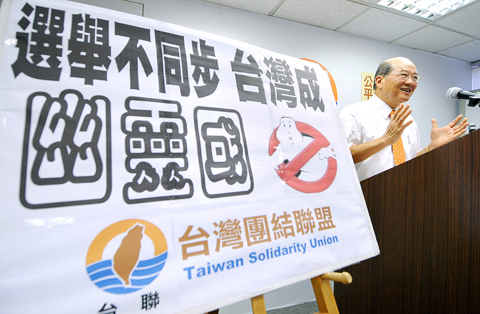Former Chinese Nationalist Party (KMT) legislator Chang Sho-wen’s (張碩文) father yesterday canceled his KMT party membership to run in the Yunlin County legislative by-election as an independent.
The move came after the KMT failed to dissuade him from running.
Yunlin Irrigation Association director Chang Hui-yuan (張輝元) said in a written statement that he would run in the by-election as an independent candidate.

PHOTO: LIAO CHEN-HUEI, TAIPEI TIMES
His daughter, Chang Yu-hsiuan (張鈺萱) yesterday completed the withdrawal process on his behalf at the KMT’s Yunlin branch.
In his written statement, Chang Hui-yuan said his decision to leave the party would give the KMT more freedom to finalize its candidate.
“Leaving the KMT is actually a big show of support for the party ... and I believe local supporters’ wisdom will be the final judge on such an unfair judicial system,” he said.
Chang Sho-wen, who won a legislative election in Yunlin County in January last year, lost his seat earlier this month after the High Court found him guilty of participating in a vote-buying scheme organized by his father.
Chang Hui-yuan, who was found guilty of vote buying in the first trial, registered with the KMT to run in the by-election on behalf of his son earlier this month.
The KMT later rejected his registration based on the revised version of its “black-gold exclusion clause,” which states that members who are found guilty of corruption at their first trial are not to be nominated for any election.
KMT Secretary-General Wu Den-yih (吳敦義) talked to Chang Hui-yuan and Chang Sho-wen on Wednesday night, but failed to dissuade Chang Hui-yuan from running.
KMT spokesman Lee Chien-jung (李建榮) yesterday expressed regret over Chang Hui-yuan’s move, but did not say whether the party would skip the primary to nominate the only registered hopeful for the by-election, Wu Wei-chi (吳威志), an associate professor at Yunlin Technology University.
The by-election will be held on Sept. 26.
In related news, the Taiwan Solidarity Union (TSU) said yesterday that the Executive Yuan should consider holding local and legislative elections at the same time to avoid the phenomenon of “phantom voters” following the approval of upgrades and mergers involving two cities and four counties.
The legal code states that a person is eligible to vote in a certain district after being a registered resident in the area for four full months.
TSU Chairman Huang Kun-huei (黃昆輝) said after the upgrades and the mergers have been completed, elections for the local government seats and legislative seats would be held one year apart, which means people could take advantage of the legal loophole to vote in two different districts by simply switching their household registration within the required time.
“In the future, population distribution could vary depending on the election season. Taiwan will become a country of phantom voters,” he said.
Huang said that a responsible government should ensure the fairness and impartiality of its elections and demanded that the Executive Yuan look into the matter.
The problem of “phantom voters” has occurred before, especially in districts where election races are tight. Some candidates mobilize non-residents to build temporary nests in a voting district in an effort to garner more votes, Huang said, giving the example of Keelung, which in 2005 reported negative population growth, but somehow returned to positive growth last month.

The Ministry of Economic Affairs has fined Taobao NT$1.2 million (US$36,912) for advertisements that exceed its approved business scope, requiring the Chinese e-commerce platform to make corrections in the first half of this year or its license may be revoked. Lawmakers have called for stricter enforcement of Chinese e-commerce platforms and measures to prevent China from laundering its goods through Taiwan in response to US President Donald Trump’s heavy tariffs on China. The Legislative Yuan’s Finance Committee met today to discuss policies to prevent China from dumping goods in Taiwan, inviting government agencies to report. Democratic Progressive Party Legislator Kuo Kuo-wen (郭國文) said

The Ministry of Economic Affairs has fined Taobao NT$1.2 million (US$36,900) for advertisements that exceeded its approved business scope and ordered the Chinese e-commerce platform to make corrections in the first half of this year or its license would be revoked. Lawmakers have called for stricter supervision of Chinese e-commerce platforms and more stringent measures to prevent China from laundering its goods through Taiwan as US President Donald Trump’s administration cracks down on origin laundering. The legislature’s Finance Committee yesterday met to discuss policies to prevent China from dumping goods in Taiwan, inviting government agencies to report on the matter. Democratic Progressive Party

Taiwan and its Pacific ally Tuvalu on Tuesday signed two accords aimed at facilitating bilateral cooperation on labor affairs, according to Taiwan’s Ministry of Foreign Affairs (MOFA). The governments inked two agreements in Taipei, witnessed by Foreign Minister Lin Chia-lung (林佳龍) and visiting Deputy Tuvaluan Prime Minister Panapasi Nelesone, MOFA said in a news release. According to MOFA, the agreements will facilitate cooperation on labor issues and allow the two sides to mutually recognize seafarers’ certificates and related training. Taiwan would also continue to collaborate with Tuvalu across various fields to promote economic prosperity as well as the well-being of their

Sung Chien-liang (宋建樑), who led efforts to recall Democratic Progressive Party (DPP) Legislator Lee Kun-cheng (李坤城), was released on bail of NT$80,000 today amid outcry over his decision to wear a Nazi armband to questioning the night before. Sung arrived at the New Taipei District Prosecutors’ Office for questioning in a recall petition forgery case last night wearing a red armband bearing a swastika, carrying a copy of Adolf Hitler’s Mein Kampf and giving a Nazi salute. Sung left the building at 1:15am without the armband and covering the book with his coat. Lee said today that this is a serious